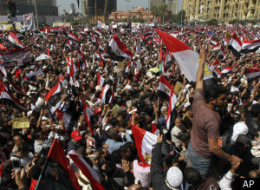
|
| Egyptian protesters on the street. Source: The Huffington Post |
Read the Article at HuffingtonPost
I tend to agree with the observation that it might be worthwhile to reorient the focus of PD efforts towards service (measurable objectives?) rather than pure 'branding.' While branding might be important at certain times for visibility and recall, the "age of conversations" actually offers meaningful opportunities to "talk about actions" as well. In a political and economic culture driven by conversations and information, PD should reorient itself towards facilitating such conversations and information that strengthen such actions, rather than just 'advertising.' However, I tend to disagree with Philip on the use of social media and I think it can be a powerful medium on a case to case basis. In some countries, social media is more democratising and empowering (sometimes) than any other medium. The world wide web in class ridden (even if politically democratic) and in closed societies, is empowering and equalizing simply because it makes information accessible to who ever is looking for it . Some BRIC countries are managing social media in a way that would help create more equitable societies.
From a service point of view, PD cannot ignore social media.
Suggestions/Critiques welcome.
-- Madhur

